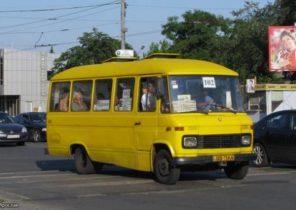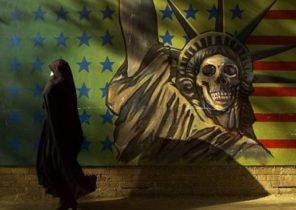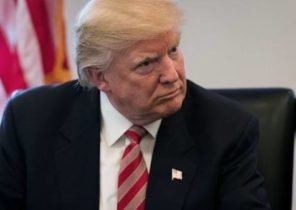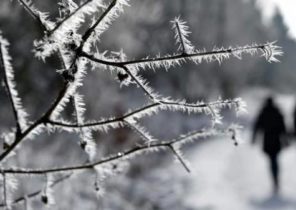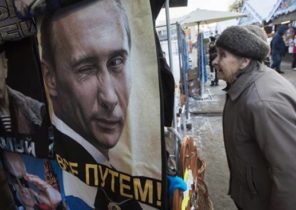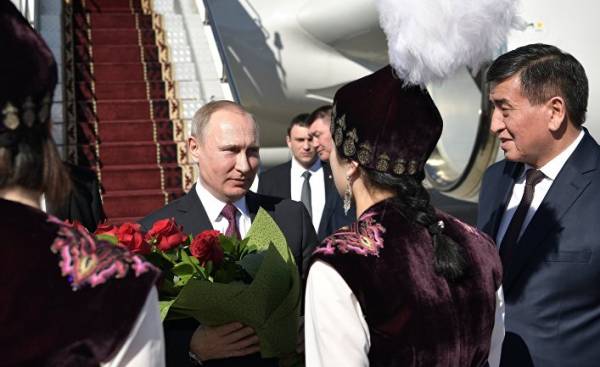
In late February the President of Russia Vladimir Putin appealed to foreign policy a little forgotten genre — toured the whole region, Central Asia. Some days, he visited Kazakhstan, Kyrgyzstan and Tajikistan, and Dushanbe still held telephone talks with President of Turkmenistan. Formally, this trip was timed to coincide with the 25th anniversary of the establishment of diplomatic relations between Russia and the former Soviet republics of the region, which will be celebrated throughout the year. However, this is a purely symbolic occasion for the visit of the Russian leader is not difficult to see continuing to gain momentum in the Eurasian vector of foreign policy of the Kremlin. On the Western direction of Moscow is still far from breakthrough in relations with the EU or the USA, but also with Belarus. But in Central Asia, Russia’s position is still strong and even stronger.
Uzbekistan
Initially it was assumed that in the Central Asian tour, Putin can get and Uzbekistan. In November in Moscow was visited by the Minister of defence of the Republic Kabul Berdiyev, the signatory with his Russian counterpart Sergei Shoigu, the agreement on developing military-technical cooperation in 2017. It is expected that in the framework of this agreement Uzbekistan, spending on military spending as much as 3.5% of GDP, will buy Russian arms instead of American, which once counted the late President Islam Karimov.
Given the importance Moscow gives to potential customers of the Russian defense industry (Russia is the second in the world after the USA exporter of weapons), one could expect that Putin during his tour visit to the newly elected President of the Uzbek Shavkat Mirzieev. But the Uzbek leader, apparently, did not dare at such a rapid rapprochement with Moscow: if at first it was reported that for his first foreign trip as President Mirziyoev chose Russia, then the decision changed, and was the first of Kazakhstan. Meeting with Putin has postponed for a few months — according to presidential press Secretary, Dmitry Peskov, it will take place before the end of spring.
Kazakhstan
The meeting of Vladimir Putin with President of Kazakhstan Nursultan Nazarbayev began with joint visits to the ski resort near Alma-ATA. In further negotiations, according to the official message of the Kremlin, discussed “issues of bilateral cooperation and key topics on the international agenda”, simply put — issues of the Syrian settlement and cooperation within the EEU. And if the results of the inter-Syrian talks in Astana, both sides assessed positively, speaking about bilateral relations, Putin was forced to admit “the decrease in turnover in terms of value”.
For this relatively mild phrasing was not the most encouraging performance achieved in the past year, the participating countries of the EAEU, enterprises, locomotives which are primarily Russia and Kazakhstan. The share of mutual trade within the EEU as of 2015 is estimated only 13.5% of the total turnover of the participating countries, and for the first nine months of last year was even less and amounted to only $29.5 billion versus $361,7 billion per trade with third countries (7.5%).
Despite the removal of customs barriers, the participants of the EAEC continue to consider this Association as a kind of formality, preferring at every opportunity to pull the blanket over himself. Evidence lacking in bilateral relations. Moscow and Minsk continue to argue for bans on the import of Belarusian agricultural products to Russia and prices for the supply to Belarus of the Russian gas. Similar conflicts between countries with the participation of “Gazprom” and “Beltransgaz” and “Transneft” has already happened in 2006 and 2010, and the emergence of the Customs Union, later reborn in the EAEC, in this respect, nothing has changed.
The unwillingness to negotiate is demonstrated not only by Russia and Belarus. Similar arguments, albeit on a smaller scale, are today between Kazakhstan and Kyrgyzstan. After the accession of the latter to the EEU in August 2015 on the border with Kazakhstan was actually abolished customs posts and cancelled phytosanitary control. However, since the beginning of the current year Astana has imposed restrictions for supply of Kyrgyz dairy and meat products to Russia and third countries. Transit was allowed only by rail in sealed wagons, and transportation vehicles is prohibited.
It later emerged that the ban concerned only 15 Kyrgyz enterprises. Further, at the request of Bishkek, the matter was submitted for consideration of the Eurasian economic Commission, and by the beginning of February, the conflict seems to be resolved, which, however, does not exclude its repetition in the future. Moreover, Kazakhstan has repeatedly imposed restrictions on the supply of Kyrgyz agricultural products, explaining the reasons of health security.
Apparently, trying to somehow smooth out the overall impression of discord within the EEU, Nazarbayev before a meeting with Putin phoned to President of Belarus Alexander Lukashenko “expressed concern” about the Russian-Belarusian conflict and offered to share their experience in relations with Kyrgyzstan. However, the mediation efforts of the President were not popular: the EEU countries still prefer to solve problems on a bilateral basis.
Tajikistan
After Kazakhstan Putin travelled to Dushanbe for a meeting with his Excellency leader of the Tajik nation Emomali Rahmon. In recent years relations between Russia and Tajikistan, are not burdened with cooperation in the framework of the EAEU, revolve around two issues: security (both countries belong to the CSTO) and labor migration of Tajiks to Russia. The current meeting of the presidents in this regard is no exception.
On the territory of Tajikistan today is the largest foreign military base of Russia — 201-I, in the first half of zero is generated from a motorized rifle division. A separate part of the Russian troops advanced on the main directions leading away from the border in a permanent state of civil war Afghanistan, where the CIS traditionally apply opiates and Islamist sentiment.
Contrary to the fears of skeptics after the withdrawal of Russian border guards to their Tajik colleagues more or less successfully engaged in the protection of this line, although the situation in Afghanistan after the NATO operation “enduring freedom” became quieter. On the other hand, in recent years, along with the weakening of the Taliban in Afghanistan intensified “Islamic state” (banned in Russia), forcing neighboring countries with even greater attention to the protection of its borders. However, Putin and Rahmon agreed to use for the protection of the Tajik-Afghan border capabilities of the 201st base of the Ministry of defense of Russia looks quite natural. Especially because of the dislocation of the Russian military on the border of speech does not go yet.
Less obvious is the willingness of Russia to declare migratory Amnesty for tens of thousands of Tajiks. Today in Tajikistan there are about 200 thousand citizens that due to administrative violations are denied entry to Russia. For a country where every tenth resident is on earnings in Russia (about 800 thousand people), which is a substantial figure, and at the meeting with Putin, Rahmon is expected to raise the issue of Amnesty.
“Overall, the decision found, and we will work in accordance with the agreement with the President of Tajikistan,” — promised the Russian President. According to first Vice-Premier of RF government Igor Shuvalov, the Amnesty will affect only those who due to various circumstances violated immigration laws, but was not involved in criminal activity. This tendency of Moscow to compromise on this issue, probably due to the fact that due to the economic crisis, the flow of Central Asian migrant workers in Russia is declining and without additional restrictions: even though all the violators will be allowed to return, their number will hardly reach pre-crisis indicators 2012-2013, when the number of migrant workers from Tajikistan exceeded one million people.
Kyrgyzstan
On the Russian military presence was mentioned during Putin’s visit to Kyrgyzstan, where he arrived, awarding Agency pre-order of Alexander Nevsky for “the strengthening of Russian-Tajikistani relations.” Commenting on the results of the meeting with Kyrgyz President Almazbek Atambayev, the Russian leader said that the future of Russian troops in the Republic, which is currently located on the shores of Issyk-Kul (954-I anti-submarine test base weapons) and at the airbase in Kant, depends on the position of local authorities and, if in Bishkek declares, “that such a base is not necessary, we will leave.”
The interest in this topic fueled Atambayev’s statement, promised that a Russian base will be closed at the expiration of the respective contract. However, this term expires in the year 2058, and the transition of power will leave his post in November this year, when Kyrgyzstan will hold new presidential elections in which the current head of the Republic may not participate. Therefore, the fate of the base in Kant, probably, will solve already the successors of the state.
Actually, therefore, the two presidents discussed not so much the issues of security as the theme of the upcoming change of power in Kyrgyzstan, which since independence has survived two revolutions (in 2005 and 2010). The possible destabilization in the country can question the stay in the Russian sphere of influence in Kyrgyzstan, which remains the most Pro-Russian country in the region. Atambayev himself is convinced that the revolution in the country “set point”, although the tension of the upcoming elections in Bishkek is already being felt — on charges of fraud and corruption, was arrested the leader of the opposition party “ATA Meken” Omurbek Tekebayev, forcing his supporters to go to rallies. This protest, in all likelihood, the authorities will be docked, however, will turn the situation in November is difficult to predict — the competition in the presidential election is expected to be very hard.
In any case, to vote citizens of Kyrgyzstan, Tajikistan contesting the title of the poorest CIS countries, will be primarily a purse and stomach, not the political beliefs of one candidate or another. This is well understood in Russia, which, according to Putin, in recent years has invested in the development of the Republic of a billion dollars. The Russian President also did not miss the opportunity to tell you about the $6 billion provided as loans to Belarus, is transparent having hinted thus that to find a more generous ally of Kyrgyzstan in any direction is unlikely to succeed.
Turkmenistan
None of the countries visited by Putin during the Central Asian tour, during his independence is not questioned the strategic partnership with Russia. This trip not only once again confirms this, but also gives grounds to say that the Russian position in the region strengthened: the new agreements in the security sphere, indicated his intention to deal with trade disputes in the framework of the EAEU. Central Asia in contrast to other parts of the post-Soviet space continues to be the region open to geopolitical project of Kremlin, despite their yet low efficiencies. The EU and the United States, mired in internal problems, significantly reduced the activity of interaction with Central Asian leaders.
Of course, there is China, whose economic interests in the region are often faced with the Russian. But the growing Chinese influence largely plays into the hands of Moscow. Central Asian countries hope to build stability at the crossroads of interests of Russia and China because of the danger of unilateral choice in favor of Beijing, some of them have already experienced. Turkmenistan decided to sell almost all of its gas to the Chinese, as a result, faced with a severe shortage of currency, because most of China’s payments for gas goes to pay for Chinese loans.
Now two of the most closed Central Asian republics — Uzbekistan and Turkmenistan — are increasingly interested in restoring the old ties with Moscow. President Karimov and Putin should meet in the next couple of months, but his imminent visit to Ashgabat was presented during the stay of the Russian President in Dushanbe. As stated in the Kremlin, the Russian President regrets very much that Turkmenistan due to the busy schedule were not included in its current schedule, but it “will certainly accept the invitation to visit the Republic in the foreseeable future”.
